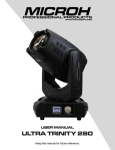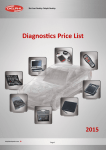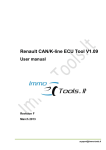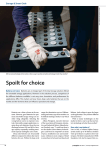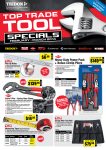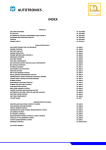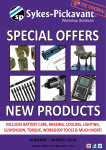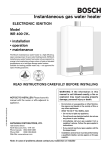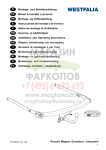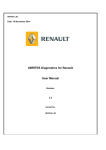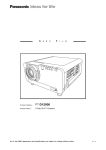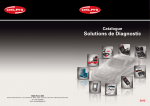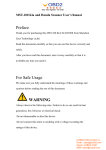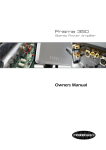Download "user manual"
Transcript
Delphi’s Magazine for Automotive Technicians // Autumn 2010 This month we talk: Delphi Service Centre P2 Fuel Pump Failure Analysis P4 OE Oxygen Sensors P6 New Delphi MAF Sensors P7 New OE EGR Valves P8 Training P8 Adding Profits With Delphi Diesel+ P9 New Diesel Filters P10 Industry Leading Chassis Range P11 PACE Awards P11 New Steering & Suspension Catalogue P11 Delphi’s New Fuel Analyser P12 VW Polo BlueMotion P14 Diagnosing Common Rail P16 Delphi Aftermarket SP Compressors P18 New Air Con Program P19 Peugeot Endurance Test P20 New Delphi Technology P22 Delphi Brake Pads & Discs P24 Endurance Test Delphi helps Peugeot to victory in ‘ultimate durability test’ Earlier this year, Delphi technology helped power two Peugeot RCZs to an impressive first and third in-class standing in a gruelling 24-hour endurance race at the Nurburgring in Germany. The vehicles were equipped with Delphi diesel fuel injection systems and powertrain cooling technology, which unlike many of the 197 other vehicles, had not been highly modified for racing. Speed and endurance // come as s tandard Peugeot had recently launched the RCZ 2.0 litre HDi coupé to mark its 200th anniversary. For the 2010 race, the company took the decision to race models that were largely unmodified from their road-going equivalents – a powerful way of demonstrating the reserves of performance and durability inherent in their standard production vehicles. Even with this extra boost, Peugeot used production Delphi charge air coolers, as supplied to road cars, as they met the performance targets required for endurance racing. // Full article on page 20 TT The two RCZs ran in the D1T category for diesel cars between 1.7 litres and 2.0 litres. The key change to the standard engine was an increase in turbo boost pressure, lifting the torque from 340Nm to 400Nm and the power from 120kW to 150kW. Don’t miss: // New OE EGR Valves P8 // New Air Con Program P19 // New Chassis Range P11 // New Diesel Filters P10 Above article image ©Julie Sueur – Endurance-info.com Turn To page 14 FOR Delphi OE technology fitted to the 2010 world car of the year! P1 Delphi Service Centre dashboard of a modern vehicle to see that an increasing number of automotive management systems are being controlled by electronics. In 2005, only 20% of systems in new cars were controlled by electronics… today this figure is more than 40% and rising. The result, engine management systems represent more than 60% of diagnostic fault codes. These advances represent a new challenge for garages. It is essential that any business invests in the right tools and parts to service these increasingly sophisticated vehicles. Braki n g, Steeri n g & Su sp en si on // DI ESEL / / Delphi Service Centre is an innovative program designed to help independent garages around the world partner with Delphi and benefit from its comprehensive offering of parts, tooling, diagnostics, training, technical and marketing support. Top issues facing today’s garage... 1. Vehicle complexity 2. Finding qualified people 3. Ongoing education & training 4. Diagnostic tools 5. OE quality products 6. Technical support 7.Marketing support Delphi Service Centre gives you the answers... 1.Advanced diagnostics based on the ‘DS’ range of tools 2.Access to OE quality parts 3.In-depth training on the very latest vehicle technologies 4.Technical knowledge 5.Specialist removal and refit tooling 6.Comprehensive marketing support to promote the network The introduction of Common Rail has revolutionised the acceptability of diesel in passenger cars, offering comparable power and performance to many petrol alternatives, and fuelling extraordinary growth in diesel cars worldwide. Operating at extreme pressures of up to 2000 bar, the Common Rail fuel injection system delivers precision control of the combustion process. The injector is key to this. Each injector is allocated an individual characterisation code relating to its specific flow rates, response times and performance at different pressures. This must be programmed into the ECU whenever a replacement injector is fitted to the vehicle. The ECU will then manage the delivery of each injector to ensure that the engine runs at optimum efficiency. These advances mean that only garages equipped with the right tools, skills and knowledge will be able to take advantage of the rapidly growing diesel servicing opportunity. P ETROL En gin e M ana gement // The introduction of advanced technologies such as gasoline direct injection (GDI), enabling a stratified fuel charge combustion for improved efficiency, has resulted in significantly more complex petrol powered vehicles. Coupled with this, you only need to look at the multi function displays on the Not so long ago, braking, steering and suspension were all separate un-integrated systems within a vehicle. The technology behind these systems has since evolved to create a single, all encompassing system called ‘Unified Chassis Control’. The introduction of reactive shock absorbers, steering angle sensors and brake assist have all helped to improve the safety, control and handling of the vehicle. This means that chassis component servicing can no longer be performed with just a diagnostic tool. Steering racks that are electrically driven will need to be re-calibrated after being fitted, electric parking brakes need to be wound back, and vehicles with air suspension will need the ‘service mode’ selecting before maintenance. Air Co nditioning // Air conditioning is no longer considered a luxury option. Fuelled by drivers’ demand for greater comfort and convenience, it now comes as standard in most new cars. 15 years of successive growth in system fitment, and a rapidly expanding parc, have all contributed to a strong air conditioning market. And because these systems need regular maintenance to be effective, the requirement for servicing and repair is significant. Surprisingly many garages still outsource this work. To tap into this lucrative servicing opportunity, technicians need to be trained on the very latest technology, keep up to date with regulation and have access to the right tools and parts. TT As an original equipment manufacturer, Delphi is in a unique position to provide valuable knowledge of the technology the market will see in vehicles today, tomorrow... and ten years down the road. Join the Delphi Service Centre network to access all the tools, skills and knowledge you need to stay ahead of the game. To find out how Delphi Service Centre could benefit your business, read more at www.delphi.com/DSC P2 Delphi’s Magazine for Automotive Technicians // Autumn 2010 P3 Reduce Comebacks Part No. 1 Contamination caused by rusted fuel lines Were they worn out or did they fail for another reason? The answers to these questions are important and without them, an accurate diagnosis is left to chance. This vehicle received two fuel modules in less than a week. The complaint was noisy operation and erratic fuel pressure. Both modules were analysed, and found to have the fuel module bucket and internal strainer heavily contaminated with rust. The external strainers showed some discolouration, but had significantly less rust in them. The cause was a rusted return fuel line. Part No. 2 External strainers of both parts show discolouration, but very little rust contamination. No significant amount of rust or contamination was found in the fuel tank because the source of the rust was the metal return line on the vehicle. The rust that was deposited went directly into the fuel module bucket, as the return line on this vehicle puts fuel directly into the fuel module bucket, not the fuel tank. Once the rust was deposited, it could not be removed. The fuel filter was not able to catch the rust because it was developing in the vehicle return line, downstream of the fuel filter. On both parts, rust was found inside of bucket and on pump strainer. Did You Know? Delphi Fuel Pump Failure Analysis What can a failed part tell you? A lot... It tells a story. Take the fuel pumps to the right. These failed pumps were not a result of incorrect testing. All tests performed were valid and provided useful data for making a diagnosis, but more could have been learned. Were they worn out or did they fail for another reason? The answers to these questions are important and without them, an accurate diagnosis is left to chance, inviting future problems for you and your customer. A failed-part analysis should always be conducted on failed fuel modules through close visual examination and some simple disassembly. Delphi aftermarket pumps and modular reservoir assemblies are exact-fit OE replacements. Intermittent starts due to bad vehicle wiring The vehicle shown below received three fuel modules over a five week time period. In each instance the vehicle would not start. Sometimes striking the bottom of the fuel tank would cause it to run. All modules were analysed and failed due to a bad vehicle electrical connector, which had not been replaced in all instances. All three modules were damaged via a burnt fuel pump ground terminal. Although damage is not extreme, it is significant enough to create repeat failures. Avoid a potential customer comeback with these simple steps. First checkpoint // Examine the electrical connectors closely and look for evidence of terminal overheating, especially at the terminals supplying current flow to the fuel pump inside the module. Badly charred and burnt terminals are easy to spot, but seemingly undamaged connections should be checked more P4 All three modules failed due to a burnt “C” terminal, the ground path for the fuel pump. Delphi’s Magazine for Automotive Technicians // Autumn 2010 closely for evidence of melting or bubbling near the electrical terminals. Any melting is an indication of excessive heating due to a poor electrical connection caused by a damaged vehicle body harness. If this type of damage is found, poor pump performance will occur due to this bad connection. The vehicle’s electrical connector must be replaced or repeat failures will occur. Second check poi nt // Examine the external strainer on the fuel module. Look for signs of dirt and/or rust contamination. Any form of dirt found in the strainer should immediately trigger an inspection of the fuel tank. A tank cleaning or replacement should be conducted, based on what is found. It is important to understand how contamination entered the fuel tank, so preventative action can be taken to eliminate future occurrences. Areas like the tank vent system should be checked to determine if contaminants entered through this area. If determined contaminants were 'pumped' into the tank or intentionally added, it’s important to change fuel supplies or add a locking gas cap to the vehicle. Thir d checkpo int // Visually examine the fuel module bucket and internal strainer. Depending on the module design, you may be able to view the module bucket through an opening in the fuel module design. If not, the bucket may have to be removed from the fuel module through disassembly. What is important to note is what has accumulated in the fuel module bucket and internal pump strainer. Contaminants entering the fuel module bucket are indefinitely trapped, so the bucket will contain a contamination history of the fuel module. A significant amount of contamination found in the bucket and internal strainer is a sure sign that the part failed due to contamination. This indicates that there are other issues on the vehicle that need addressing prior to the installation of a new fuel module. Analysis of actua l failure s // Above are actual scenarios showing failed modules. Since these issues were not identified during the initial diagnosis, the results were repeat failures. Upon such closer inspection, all the needed repairs could have been made. More important, a customer 'comeback' would have been avoided. TT P5 O2? OE! Get Wide How Refreshing Coverage with New Delphi MAF Sensors Did You Know? As one of only four OE manufacturers of oxygen sensors, Delphi has manufactured more than 250 million O2 sensors since 1974. Delphi: A Leader in Planar Technology Nine New MAF Sensors Provide Coverage for Over 600 Popular European Applications As one of the leading suppliers of oxygen sensors, Delphi planar technology is the result of our OE and aftermarket engineers partnering together to develop one of the most innovative oxygen sensor programs for the aftermarket. Integral to the engine’s performance and efficiency, the mass air flow (MAF) sensor measures the flow and density of air into the combustion chamber. The resulting voltage tells the vehicle computer to adjust the injector pulse to change the amount of fuel delivered. Capitalising on our OE technology, we developed a smarter solution with wider aftermarket coverage for older and late model applications. The oxygen sensors are configured and designed to replace previous conical sensor designs. In doing so, Delphi has increased coverage, but decreased SKUs. We call it intelligent SKU management... a simpler way to repair. Delphi MAF sensors are designed, engineered and manufactured to exacting OE standards, delivering accurate air flow measurements and enhanced engine performance. And unlike other brands, • D elphi oxygen sensors deliver the industry’s fastest light-off time (LOT) at six seconds for quicker closed-loop activation.The closest competitor is 10 to 12 seconds, allowing 40% to 50% more harmful cold start emissions to enter the atmosphere ses a proprietary 'dry to touch' anti-seize • U compound for faster, no mess installations. The compound eliminates the potential for contamination and triggering an unintended 'check engine light' from the wet, anti-seize compounds used on competitor products • V alidated for use with most fuel types and additives, including lifetime operation with ethanol blended fuels (i.e. E85) P6 Delphi’s Magazine for Automotive Technicians // Autumn 2010 The rationalised range of nine MAF sensors covers over 600 popular European applications including Fiat Punto, VW Golf, Vauxhall/Opel Corsa and Mazda 6. In consolidating the line, we are helping distributors and garages to reduce their inventory by stocking fewer part numbers. TT Delphi MAF sensors are designed, engineered and manufactured to exacting OE standards, delivering accurate air flow measurements and enhanced engine performance. Why Delphi Planar Technology? • L eads the industry in contamination resistance to silicone, phosphorous and other fuel/oil additives due to its patented protective sensor coating. Contaminated sensors can trigger 'check engine lights' and cause engines to run too rich, burning up to 25% in additional fuel, as well as sending excess emissions into the atmosphere Delphi supplies the sensor and not the complete MAF assembly. As a high percentage of failures relate to the sensor, this ensures a cost-effective, simple solution for the vehicle owner. Did You Know? Delphi has delivered more than 55 million MAF sensors for more than 500 different customer applications since 1993. • T ested for durability, performance and environmental compliance; up to 15 years/150,000 miles • T hree times more coverage than our closest competitor • E liminates fit and connector length concerns due to consolidated part offering TT DELPHI PART NUMBER KEY APPLICATIONS AF10078-12B1 AUDI A3, 1.9L; A4 1.8L; FORD Galaxy, 1.9L; SEAT Alhambra, 1.9L; Leon 1.8L; SKODA Fabia, Octavia, 2.0L; VOLKSWAGEN Bora, Golf, 1.9L; New Beetle 1.8L; Polo 1.4L AF10079-12B1 AUDI A3, 1.8L; VOLKSWAGEN Bora, Golf, 1.8L, 2.0L; New Beetle, 2.0L; Lupo, 1.2L AF10080-12B1 VAUXHALL/OPEL Astra, Combo, Corsa, 1.7L; Astra, 2.0L AF10081-12B1 AUDI A3, A4, 1.9L; SEAT Leon, Toledo, 1.9L; TOYOTA Liteace, 2.0L; VOLKSWAGEN Bora, Golf, Passat, 1.9L; Bora, Caravelle, Golf, Passat, 2.4L; Transporter, 2.5L AF10082-12B1 ALFA ROMEO 145, 146, 1.4L, 1.6L, 1.8L; 147, 1.6L, 2.0L; 156, 1.6L, 1.8L, 1.9L, 2.0L, 2.4L; 166, 2.4L; CITROËN Jumper, Relay, 2.8L; FIAT Brava, Bravo, Multipla, 1.9L; Idea, Panda, Punto, 1.2L; Marea, 1.9L, 2.4L; Ducato, 2.8L; FORD Mondeo, 1.8L; HONDA Accord, 2.0L; LADA 110, 111, 112, Diva, Forma, Sagano, Samara, 1.5L; Niva, 1.7L; Samara, 1.3L; LANCIA Lybra, 1.9L, 2.4L; Musa, 1.2L; MAZDA 6, 2.0L; MG ZS, 2.0L; NISSAN Primera, 2.0L; VAUXHALL/OPEL Astra, 1.2L, 2.0L; Corsa, 1.0L, 1.2L; Frontera, Omega, Sintra, 2.2L; Vectra, 2.0L, 2.2L; Zafira, 2.0L; PEUGEOT 406, 2.0L; ROVER 25, 45, 220, 420, Streetwise, 2.0L; SAAB 900, 2.0L; SUZUKI Swift, 1.3L, 1.6L; VOLVO S70, S80, V70, 2,5L AF10083-12B1 AUDI A4, A6, 1.9L; SEAT Cordoba, Ibiza, 1.9L; VOLKSWAGEN Caddy, Caravelle, Transporter, 2.5L; Passat, Polo, 1.9L AF10084-12B1 AUDI A4, A6, A8, 2,5L; CITROËN Jumpy, 1.9L; SEAT Alhambra, Cordoba, 2.0L; Alhambra, Toledo, 1.8L; SKODA Fabia, Octavia, 2.0L; VOLKSWAGEN Bora, Golf, 1.6L, 2.0L; New Beetle, Sharan, 1.8L, 2.0L; Multivan, Transporter, 2.0L, 2.0L; Passat, 2.5L AF10085-12B1 LAND ROVER Freelander, 2.0L; NISSAN Primera, 2.0L AF10087-12B1 MERCEDES C-Class, Vito, 2.2L; Sprinter, 2.2L, 2.7L P7 Adding Profits to your Business with Delphi Diesel+ Delphi Helps Vehicles Stay GREEN with Increased EGR Valve Coverage Today’s diesel user expects high performance, coupled with low fuel consumption and low emissions. Adding fuel treatments to a diesel fuel tank can not only help boost engine efficiency, but can also provide an additional revenue stream for garages. Did You Know? Delphi engineers invented the linear EGR Valve for OEMs in the 90s. Delphi has launched two new OE exhaust gas recirculation (EGR) valves fitted to the PSA DW10B engine. Including popular Peugeot, Citroën, Ford, Volvo and Fiat applications, the new part numbers extend Delphi’s coverage by more than 2.5 million vehicles. The EGR valve re-circulates finely metered amounts of exhaust gas into the engine intake, helping to reduce oxides of nitrogen (NOX), whilst maximising the performance of the engine. Need training? Talk to us at [email protected] DELPHI PART NUMBER KEY APPLICATIONS EG10395-12B1 FORD C-Max, Focus, Galaxy, Kuga, Mondeo, S-Max, 2.0L; VOLVO C30, C70, S40, S80, V40, V50 2.0L EG10396-12B1 CITROËN C4, C8, 2.0L; FIAT Scudo, Ulysse, 2.0L; LANCIA Phedra, 2.0L; PEUGEOT 207, 307, 308, 407, 607, 807, 2.0L Get a Competitive Edge with Delphi Training At Delphi, we work closely with the world's leading vehicle manufacturers to help them meet the challenges of increasingly stringent vehicle emissions legislation, as well as consumer demands for more powerful and more fuel efficient vehicles. By helping design the systems at the outset, we fully understand all of the complexities and can offer technicians access to the very best training and support at our state-of-the-art training schools around the globe. To help garages take advantage of the service opportunity on today’s modern vehicles, Delphi provides an extensive global training program covering all capabilities, from basic level diagnostics, right through to the in-depth knowledge required to service the most advanced OE systems. We even offer courses designed to help maximise business opportunities. TT P8 Available in port, backpressure, and linear configurations, the 100% OE program covers leading diesel and petrol engine applications. All Delphi EGR valves use precision machined valves and seats to help maintain long-term stability and high-temperature materials for internal windings for high exhaust temperature performance. They also offer rugged environmental protection for corrosion resistance. And as an exact fit, there is no need for part or vehicle modification, saving the garage both time and labour. TT Delphi’s Magazine for Automotive Technicians // Autumn 2010 Examples include: • Injector servicing and diagnostics • A dvanced ABS and chassis control systems teering and suspension and wheel • S alignment fault finding and diagnosis • A ir conditioning servicing and fault diagnosis • Engine management and diagnostics • Multiplex and CAN databus systems • Introduction to hybrid vehicle systems As a leading manufacturer of OE diesel fuel injection systems, Delphi knows just what it takes to keep a diesel engine in optimum condition. Our Diesel+ fuel treatment, part number HAD100, is designed to provide superior engine protection. Developed in conjunction with Chevron, and incorporating the very latest Texaco fuel technology, it enhances the fuel’s ability to clean, protect and restore. Delphi’s Diesel+ is a single dose, fuel based treatment which is effective in the vehicle’s fuel system for up to 6 months. Unlike many other fuel additives which are added during each refuelling, Delphi’s Diesel+ is a single dose, fuel based treatment which is effective in the vehicle’s fuel system for up to 6 months, safeguarding the system long after it is filled up. The high strength formula is supplied in 350ml bottles for single doses treating 50 to 70 litres of fuel. This makes it an ideal product for garages. By incorporating this as part of a standard service regime, garages can offer an added value service to their customers, whilst increasing their revenue and profits. A win-win for both! TT Diesel+ contains seven key elements to aid engine efficiency and enhance injector life and effectiveness, including: • A n additional detergent to clean up injector deposits. This helps to maintain the correct spray patterns, improving fuel economy and providing more power • A demulsifier to ensure clean phase separation between water and fuel which protects against filter blocking and water contamination of the fuel delivery system • A lubricity agent to compensate for the lower lubricity of some modern diesel fuels. This reduces wear in the fuel pump resulting in longer engine and pump life • A n anti-foam agent to prevent excessive foaming during filling • A fuel stabiliser to prevent acid-base reactions that can cause fuel instability. This helps to ensure that the fuel operates at maximum efficiency through to combustion Delphi’s Diesel+ part number HAD100, is designed to clean, protect and restore. • A corrosion inhibitor to prevent rust which can reduce engine performance and life • A cetane enhancer to improve the quality of the combustion process, helping to improve cold starting, reduce combustion noise, smoke and CO2 emissions • Parts operations and selling • M aximising the Delphi Service Centre opportunity Diesel+ is available through Delphi’s authorised network of distributors, workshops and Delphi Service Centre garages. For further information, visit our website at www.delphi.com/am P9 Bringing OE An Industry Leading Filtration Expertise to the Aftermarket Range Going From Strong to Stronger Delphi is launching 29 new original equipment quality filters fitted to popular diesel car and light-duty applications, including Fiat Punto, Vauxhall/Opel Corsa, Renault Scenic, VW Polo, Seat Ibiza, Audi A4 and Honda Civic, providing coverage of an additional 10 million vehicles. For over 100 years, Delphi has been supplying innovative OE technology to vehicle manufacturers around the globe. Today our diesel fuel filters are fitted as OE to millions of car and light duty vehicles, as well as the best known truck, buses and off-highway applications. Did You Know? Even the smallest amount of dirt, air or water can cause damage to modern fuel injection systems. In fact, the most damaging particles are the smallest ones – just 2 to 5 microns in size. DELPHI PART NUMBER We bring this very same OE expertise to the aftermarket. Whether designed for an OE or aftermarket application, we apply the same stringent validation, manufacturing and testing procedures. Every filter adheres to Delphi’s exacting quality standards. But what does this mean to the garage? You know that when you install a Delphi filter, you are getting a product that has been designed, engineered and manufactured to provide the same levels of filtration performance and durability, as demanded by the vehicle manufacturer. TT KEY APPLICATIONS HDF575 SEAT Ibiza 1.4L, 1.6L, 1.9L, Cordoba, SKODA Fabia, Praktik, Roomster 1.4L, VOLKSWAGEN Fox 1.4L, Polo 1.4L, 1.6L HDF576 SEAT Cordoba, Ibiza, Ibiza Cupra, SKODA Fabia 1.9L, VOLKSWAGEN Polo 1.9L HDF577 RENAULT Megane, Scénic 1.5L, 2.0L, Grand Scénic 2.0L HDF578 MITSUBISHI Grandis, Lancer, Outlander 2.0L HDF579 HONDA Accord 2.2L, Civic 1.7L HDF580 NISSAN Cabstar 3.5L, 4.5L, RVI Maxity 2.8L, 3.2L, 3.5L, 4.5L HDF581 DACIA Logan 1.5L, SUZUKI Jimny 1.5L HDF582 NISSAN Qashqai 1.5L, 2.0L, X-Trail 2.0L HDF583 DACIA Logan 1.5L HDF584 RENAULT Scénic 1.5L, Grand Scénic, Megane 1.5L, 1.9L, 2.0L HDF585 LAND ROVER Defender, Discovery 2.5L HDF586 AUDI A4, A6 1.9L, SKODA Superb 1.9L, VOLKSWAGEN Passat 1.9L HDF587 NISSAN Navara, Pathfinder 2.5L HDF588 RENAULT Grand Scénic 2.0L, Megane, Scénic 1.5L, 2.0L HDF591 HYUNDAI Accent, Getz, Matrix 1.5L, Sonata 2.0L, H-1 2.5L, KIA Cerato, Rio 1.5L, Magentis 2.0L HDF592 HYUNDAI Accent, Getz, Matrix 1.5L, Sonata 2.0L, Grandeur, Santa Fé 2.2L, H -1 2.5L, KIA Carens, Rio, Sorento 2.0L HDF593 VOLKSWAGEN LT 28-46 2.8L, VOLVO S60, S80, V70, XC70 2.4L HDF594 SMART Cabrio, City-Coupé, Fortwo 0.8L HDF595 AUDI A4, A6 2.0L HDF597 RENAULT Kangoo 1.5L, Laguna, Grandtour 1.5L, 2.0L, 3.0L HDF598 AUDI A4 2.7L, 3.0L HDF599 HONDA Accord, Civic, CR-V 2.2L HDF603 AUDI A4, A5 2.0L, 2.7L, 3.0L HDF604 MITSUBISHI L200 2.5L HDF605 HYUNDAI Accent, GLS 1.5L, Getz, GLS 1.5L, Matrix 1.5L, KIA Cerato 1.5L, 1.6L, Rio 1.5L HDF606 IVECO Daily 29, 35 2.3L, Daily 29, 35, 50, 65 2.8L HDF607 CHRYSLER Voyager 2.5L HDF608 CHEVROLET Captiva, Epica, Lacetti, Nubira 2.0L, CITROËN Jumper 2.0L, 2.2L, 2.8L, 3.0L , Jumpy 2.0L, FIAT 500 C, 500 Multijet 1.3L, Croma Multijet 1.9L, Doblo, Doblo Multijet 1.3L, Ducato, Ducato Multijet 2.2L, 2.8L, 3.0L, Idea 1.3L, 1.9L, Panda, Panda Multijet 1.3L, Panda, Sedici Multijet 1.9L, Strada Multijet 1.3L, LANCIA Musa Multijet 1.3L, Ypsilon 1.3L, OPEL/VAUXHALL Agila 1.3L, Antara 2.0L, Astra H 1.3L, 1.9L, Astravan 1.3L, 1.9L, Combo Body, Combo Tour 1.3L, Corsa C, Corsavan, Meriva, Tigra 1.3L, Signum, Vectra, Zafira 1.9L, PEUGEOT Boxer 2.0L, 2.2L, 2.8L, 3.0L, SAAB 9 -3 1.9L, SUZUKI Ignis, Splash, Swift 1.3L, SX 4 1.9L, 2.0L (Pleated Filter Media) HDF954 Delphi remains committed to developing its range to meet the needs of a diverse and ever growing vehicle parc. Proven by the fact that in 2010 alone, Delphi has added over 540 new parts to its industry leading range of chassis products. Manufactured to exacting OE standards, the new range includes 65 brake pads, 103 brake discs, 105 brake hoses, 70 calipers and 200 steering parts. But it doesn’t stop there – a further 300 plus parts are planned throughout the rest of the year. Real World Innovation One area of significant focus for Delphi is brake pads and brake discs, where our objective is to be first to market by launching replacement parts within 6 months to 1 year of vehicle launch. This is happening now with parts available for the latest vehicle releases including: BMW Z4 2009 >, Vauxhall/Opel Astra 2009 >, Chevrolet Cruze 2009 >, Nissan 370Z 2009 >, Toyota Avensis 2009 >, Toyota Prius 2009 >, Honda Accord 2009 > and Citroën DS3 2010 >. Earlier this year Delphi was honoured with two Automotive News Premier Automotive Suppliers’ Contribution to Excellence (PACE) awards for its multimode electronically scanning radar and Common Rail injector technology. Recognised around the world as an industry symbol of innovation, PACE awards acknowledge innovation, technology advancement and business performance. Since 1995, when the award was first presented, Delphi has been recognised with 12 PACE awards, more than any other company. TT Delphi – helping to make vehicles safe, green and connected… Innovation for the Real World. TT Delphi’s PACE Awards: • • • • • • • • • • • • 996 GEN II Pressure Sensor 1 1999 Electronic Steering 2000 Adaptive Cruise Control 2001 Math-based Metal Removal Software 2002 Gen II Passive Occupant Detection System 2002 Four-wheel Steering 2003 Variable Suspension Damping 2004 Back-up Aid and Side Alert 2004 +++ Horizontal Modeling and Digital Process Design for CAD/CAM 2008 Sirius Back Seat TV 2010 Common Rail Injector 2010 Multimode Electronically Scanning Radar New Steering & Suspension Catalogue Delphi is pleased to announce the launch of its new European steering and suspension catalogue for 2010-11. The catalogue contains the full range of Delphi steering and suspension parts, including ball-joints, wishbones, bushes, link stabilizers, track control arms, tie rod, king pins and steering rack gaiters. With over 380 new part numbers added since the last catalogue in September 2009, Delphi continues to demonstrate its strength as an industry leading provider of OE quality steering parts. These latest additions take our vehicle parc coverage to in excess of 90%. The range can also be found on TECDOC. TT DACIA Logan, Sandero 1.5L Tell us what you think about the new range at [email protected] P10 Delphi’s Magazine for Automotive Technicians // Autumn 2010 P11 Fuelled by Innovation! Did You Know? A robust, handheld unit, the tool is designed to provide workshops, garages and fleets with real time analysis of fuel content at an affordable price. Independent research has shown that up to 80 percent of diesel engine problems stem from contaminated or poor quality fuel. A First for the Market with Delphi’s New Fuel Analyser Running vehicles on poor quality or contaminated fuel can lead to performance issues such as filter plugging, injector coking, piston ring sticking and breaking. Such problems need to be identified at the earliest possible opportunity in order to minimise the risk of longer term damage to the engine. Immediate and accurate analysis of the fuel is therefore critical. Using the new Delphi Fuel Analyser, part number YDT553, technicians will be able to perform a first level diagnostic to check if the fuel meets the latest EN590 standard and identify potential contamination problems. Similarly, commercial vehicle fleets can use the tool to analyse the quality of fuel before refuelling, reducing the risk of fuelrelated engine problems. Until now, the only option has been to send samples to a specialist laboratory for analysis, costing both time and money. giving immediate and accurate results via a digital display screen. The volume of fuel required to undertake the analysis is only 46ml, which can be retrieved from the fuel pump or filter. This will allow technicians receiving only system components to check the fuel, just as easily as those working directly on the vehicle. With this data, the user can quickly establish whether there is an unacceptable amount of bio diesel or any impurities present that may impact on the fuel injection system. The complete fuel analyser kit from Delphi includes a USB cable, a mains adapter, three 50ml measuring tubes, a quickstart guide and a CD with a user manual and reporting software. It is available in 10 languages through our network of authorised Delphi distributors and workshops. TT A robust, hand-held unit, the tool provides workshops, garages and fleets with real time analysis of fuel content at an affordable price. It specifies the level of bio diesel in the fuel sample and identifies whether any impurities are present, P12 Delphi’s Magazine for Automotive Technicians // Autumn 2010 P13 Volkswagen Chooses Delphi Technology to Develop the Polo BlueMotion – Cleanest Car in it’s Class and Voted 2010 World Car of the Year Delphi Corp. and Volkswagen have developed one of the 'greenest' diesel systems ever produced with the new 3-cylinder VW Polo BlueMotion After more than a year of co-development with Volkswagen, Delphi is supplying its Multec® Diesel Common Rail System for the new 1.2 litre, 3-cylinder Volkswagen Polo BlueMotion. Voted 2010 World Car of the Year, the result is a cleaner, greener car that achieves record low CO2 emissions and fuel consumption without compromising on performance. In addition to Delphi’s Multec® Diesel Common Rail system, the VW Polo BlueMotion is fitted with a Delphi radiator, compressor and antitheft and immobiliser systems. Did You Know? Delphi ’s Multec ® C ommon Rail Sy stem // drivin g down emissio ns A c loser look at the DFP6 p ump // Delphi’s Multec® Diesel Common Rail System, with a balanced valve fast servo-solenoid injector, was launched in 2000 and has since evolved to meet changing emissions standards, while maintaining cost and performance competitiveness. Unveiled at the International Motor Symposium in Vienna earlier this year, Delphi’s DFP6 single plunger rail fuel pump is designed to simplify packaging and reduce weight while providing 2,000 bar maximum rail pressure. The pump combines a relatively small specific capacity of up to 0.42 cc/rev with the capability to run at engine speed, allowing it to be used on a range of engine sizes up to 2.2 litres. It features a new compact hydraulic head design which helps to improve the volumetric and mechanical efficiency, enabling a potential reduction of engine CO2. The new concept is much stiffer than the previous generation head, with Delphi’s integrated inlet valve assembled directly into the head and a forged high-pressure outlet, which incorporates the outlet valve and helps to achieve reduced stress. The Common Rail system on VW Polo BlueMotion includes the latest solenoid type diesel Common Rail injector technology with Delphi’s next generation DFP6 fuel pump. This combination allows for just 87 g/km of CO2 emissions. “Delphi’s new Common Rail system provides significantly improved fuel delivery control, extended multiple injection capability, enhanced spray atomisation and air mixing,” said John Fuerst, General Manager, Delphi Diesel Systems. “The system in this vehicle can deliver up to six injection events per combustion cycle, which translates into a very smooth combustion process and therefore lowers the NVH levels.” Delphi…the company that makes the parts cars are born with. For more information on Delphi Common Rail and other technologies, check out our website on www.delphi.com/am P14 Delphi’s Magazine for Automotive Technicians // Autumn 2010 The VW Polo BlueMotion was chosen as ‘2010 World Car of the Year’ from a list of 30 entries nominated by 59 World Car jurors from 25 countries. The cars were judged on merit, value, safety, environment, significance and emotional appeal. The DFP6 pump also features an innovative roller and shoe mechanism. The twin lobe cam offers two pumping events per revolution, reducing the number of pump strokes needed. The roller cam shoe mechanism has a patented static shoe guide that has been designed to reduce torque, dynamic mass and noise. TT P15 Diagnosing Common Rail Diesel System Faults By following a simple guide to diagnosing faults with Common Rail diesel systems, garages can improve their efficiency and open up a new and profitable revenue stream The growth in the Common Rail diesel parc presents a great servicing opportunity for garages with the right equipment and knowledge. However, to service these sophisticated systems effectively, efficiently and safely, garages should follow a few simple steps. By replacing individual injectors rather than a whole set, garages can save both time and money. Assess the fuel quali ty // The first step for any garage should be to perform an initial diagnostics on the quality of the fuel. Delphi’s fuel analyser (part number YDT553) gives garages the ability to measure the percentage of bio diesel in the fuel and identify the presence of impurities. This will enable the technician to confirm whether fuel is the root cause of the problem. Once the quality of the fuel has been established further diagnostics will be required, to either assess the component damage if fuel is the issue, or pinpoint the fault if otherwise. Ident ify the fault code // The first stage in identifying a fault with a Common Rail diesel system is to interrogate the vehicle’s On Board Diagnostic (OBD) system. By using a good quality all makes diagnostic tool such as Delphi’s PDA based DS100E (part number SV10166) or laptop based DS150E (part number SV10546), technicians can identify the fault codes generated and then focus their attention on this area of the vehicle. Check the in jectors // If the OBD system has generated a fuel injection system fault code, the next item to be checked is the injector’s functionality. Tools such as Delphi’s Sealed Rail Diagnostic Kit (part number YDT278) can be connected to the injectors, preventing the need for a complete system removal and refit. As an all-makes tool, the Sealed Rail Kit is compatible with Common Rail systems from Delphi, Bosch, Denso and Continental, reducing the need for investment in multiple tools. The back leakage equipment on the Sealed Rail Kit collects and measures back leakage flow from the injectors and indicates which injector may be damaged or faulty and in need of replacement. By replacing individual injectors rather than a whole set, garages can save both time and money. P16 Delphi’s Magazine for Automotive Technicians // Autumn 2010 C heck the C ommon Rail pu mp functi on // Once the injectors have been checked, the functionality of the Common Rail pump should be investigated. This time the Sealed Rail Kit is fitted directly onto the high-pressure outlet pipe from the pump and the operator cranks the engine to record pressure in the system. The Sealed Rail Kit displays the results digitally and if the figure differs from the specified pressure measurement for the vehicle application, the pump could be faulty. C onfi rm if a mechani c al or el ectr i cal p ump fa ult // If the Common Rail pump is suspected of being faulty, Delphi’s False Actuator Kit (part number YDT410) should be used in conjunction with the Sealed Rail Kit for further interrogation. The False Actuator Kit temporarily replaces the vehicle’s actuator to enable the pump to generate full system pressure. If the pump generates the correct pressure with the False Actuator in place, then the vehicle actuator is likely to be at fault and should be replaced. However, if the pressure is still below the required level when tested with the False Actuator, then the Common Rail pump is likely to have a mechanical fault and should be repaired or replaced. TT Vehicle enters workshop Fuel Analyser Assess fuel quality Lack of pressure in Common Rail system diagnosed Sealed Rail Kit Carry out mechanical test of pump and injector (part number YDT278) DS100E Electronic fault diagnosis Faulty component identified Faulty Injector Delphi Common Rail Tool Kits Remove/refit failed Delphi Common Rail components using range of specialist tools Faulty Pump False Actuator Kit Determine whether fault is actuator related or an internal mechanical failure (part number YDT410) Delphi’s DS100E and DS150E enable garages to quickly diagnose faults across a wide range of on-board electronic vehicle systems, including engine management, ABS, air conditioning, gearbox, instrument dashboard and immobiliser systems. The tools support 47 vehicle manufacturers and over 30,000 applications. Other platforms in the DS range include the DS350E, based on a UMPC, DS500E, DS550E and DS800E. By joining an established network such as Delphi Service Centre, independent garages are paired with technical partners who can provide extensive technical support and training, to help overcome any challenging issues. Garages are also provided with a full range of diagnostic tools, ensuring they have all of the resources required to make their first step into diesel. To learn what Delphi Service Centre can do for your business, visit www.delphi.com/DSC or if you have any questions, drop us an e-mail at [email protected] P17 Delphi Aftermarket Cool New Air Conditioning Program! SP Compressors Validated to Meet or Exceed OE Specifications Unlike some competitors in the aftermarket, Delphi has a validation and durability test schedule to ensure our products perform in the most extreme conditions vehicles would experience worldwide. When Delphi introduced its aftermarket SP compressors earlier this year, the product line was developed based on Delphi’s innovative SP technology used by major OEMs worldwide. But Delphi did more than bring Original Equipment (OE) engineering and design expertise to the aftermarket. It applied the same stringent validation, testing and manufacturing processes it does to every component it produces. “Whether it’s engineered and designed for OE production or an aftermarket application, every Delphi part must adhere to the company’s global technical requirements,” said Mark Shasteen, Vice President, Global Service and Engineering, Delphi Product & Service Solutions. All parts released for the aftermarket undergo the same rigorous product development processes including Production Part Verification (PPV) and Production Part Approval Process (PPAP) according to Shasteen. The purpose of PPV is to confirm the part being produced performs exactly as the prototype was designed; and the purpose of the PPAP is to ensure every part meets all of the requirements defined in the engineering samples. What’s more, any plant manufacturing a Delphi part must adhere to all of Delphi’s manufacturing standards to include performance, noise and durability testing. “Unlike some competitors in the aftermarket, Delphi has a validation and durability test schedule to ensure our products perform in the most extreme conditions vehicles would experience worldwide,” said Shasteen. P18 Delphi’s Magazine for Automotive Technicians // Autumn 2010 Check Out Our Delphi is launching 105 new aftermarket part numbers for air conditioning systems, including compact variable compressors, condensers and blower motors. More than a decade ago, Delphi created its exclusive compressor life-cycle test based on data from cars driving in real-world conditions, including personal vehicles, taxi fleets and police fleets. After recording the conditions the vehicle compressors were exposed to, Delphi standardised its durability test schedule, which is used for its OE and aftermarket compressors. Delphi’s SP compressors were tested to Delphi’s durability requirements — which, in some cases, are more stringent than those of the global OEMs it serves — and met the demands of completing the test without exhibiting excessive wear. Like all products in Delphi’s aftermarket thermal line, the compressors are designed to last a minimum of 50,000 miles. The SP compressors also meet the designated performance requirements and exceed the Delphi requirement that calls for a noise differential of less than 3 dB. In addition, Delphi’s SP compressors underwent vehicle fit and leak testing to ensure Delphi-caliber quality. “Because of our 100 year OE heritage, this is the way Delphi has always engineered, developed and tested parts, which sets us apart from many of our competitors in the aftermarket,” said Shasteen. Delphi’s new compressors fit popular late-model domestic and import applications, with coverage for more than 13 million vehicles. Since 1910, Delphi has brought heating and cooling innovations to the automotive market, and remains a leader in developing OE-quality solutions for vehicle manufacturers and the aftermarket. This includes the first automotive radiator in 1911, the first car heater in 1929 and the first vehicle air conditioner in 1954. TT Did you know that…? Delphi has a rich history as a supplier of OE thermal technology to global car manufacturers. Delphi supplies major HVAC systems with Delphi compressors pumping refrigerant through complex air conditioning systems for the Ford Fusion, Mercury Milan, Toyota Tacoma, Porsche Cayenne and Audi Q7, in addition to a host of other OEMs around the world. Delphi is launching 105 new aftermarket part numbers for air conditioning systems, including compact variable compressors (CVC), condensers and blower motors. These will all be listed in Delphi’s new 2010 European air conditioning catalogue. Delphi’s CVCs feature the very latest variable displacement piston compressor technology. Based on a swash plate simple harmonic motion mechanism, they offer better fuel economy, optimum integration, more fuelefficient air conditioning load management, high speed operation and less noise and vibration. The new OE compressors cover popular late-model applications, including: Volkswagen Golf 6, Polo 6, Passat 6, Renault/ Nissan Megane/ Gd Scenic, Koleos, Qashqai/ X-Trail, Modus; and Vauxhall/Opel Insignia. “In addition to introducing the latest Delphi OE compressors, we are also using Delphi’s engineering capabilities and proven technology to bring OE solutions to the aftermarket,” said Marcelo Ganasevici, Global Product Line Director, Independent Aftermarket, Delphi Product & Service Solutions. “We are fitting our OE compressor to a broader range of OE models to help deliver true value by allowing the aftermarket customer to gain access to our long Tier 1 OE supplier history, technology and quality through an attractive alternative to current product offerings.” “All of these new compressors can be found in the new European air conditioning catalogue which is the most comprehensive to date, with some 1773 part numbers covering cars, commercial vehicles and heavy duty applications”, says Redouane Benhmida, DPSS business line manager for thermal system products. The range covers 94% of the European car parc, including 97% for cabin air filters, 94% for compressors, 94% for condensers and 94% for receiver driers. Delphi’s new air conditioning marketing support program for garages and distributors includes a catalogue and four product leaflets. Included for the first time are blower motors with key applications such as: Vauxhall/Opel Astra; Alfa Romeo 147; and Renault Laguna 01. The catalogue also includes new applications for Delphi OE condensers for: PSA C5, 407; Astra H/Zafira; and Ford Transit. The catalogue is supported by a comprehensive range of marketing support material. TT Delphi Service Centre garages are trained in the very latest air conditioning technology, equipped with specialist tools and have access to a wide range of OE quality parts P19 Endurance Test Speed and endurance come as standard The two RCZs ran in the D1T category for diesel cars between 1.7 litres and 2.0 litres. The key change to the standard engine was an increase in turbo boost pressure, lifting the torque from 340Nm to 400Nm and the power from 120kW to 150kW. Even with this extra boost, Peugeot used production Delphi charge air coolers, as supplied to road cars, as they met the performance targets required for endurance racing. “This event has been called the ultimate durability test,” said John Fuerst, Delphi’s General Manager, Diesel Engine Management Systems. “Delphi successfully faced this test with production products on the RCZs that needed little or no modifications to perform in this gruelling race. We are delighted to have been selected as a technical partner for Peugeot and to have helped them achieve such an impressive result in the company’s 200th anniversary year.” Delphi helps Peugeot to victory in ‘ultimate durability test’ Earlier this year, Delphi technology helped power two Peugeot RCZs to an impressive first and third in-class standing in a gruelling 24-hour endurance race at the Nurburgring in Germany. The vehicles were equipped with Delphi diesel fuel injection systems and powertrain cooling technology, which unlike many of the 197 other vehicles, had not been highly modified for racing. Peugeot had recently launched the RCZ 2.0 litre HDi coupé to mark its 200th anniversary. For the 2010 race, the company took the decision to race models that were largely unmodified from their road-going equivalents – a powerful way of demonstrating the reserves of performance and durability inherent in their standard production vehicles. Delphi’s production 2000 bar Common Rail system with MultecTM balanced-valve fast servo-solenoid injectors met the modified engines’ demands with minimal revisions. Extensive trials established that the only significant upgrade required was to change the nozzle definition, optimising the spray pattern to suit the increased swirl created by the higher boost levels. The new configuration also increased maximum fuel flow, contributing to the increase in power and torque. The standard fuel pump was retained without modification. “For a race car to use a production ECU is a particularly rare event but Delphi achieved this as well,” said Fuerst. “Our technical specialists modified the software of the standard ECU to allow Peugeot to re-calibrate the engine mapping to suit the demands of endurance racing with the re-tuned engine. To meet the challenges of such a gruelling race with systems that were originally designed for road car applications is very satisfying for us and is a clear indication of the quality of Delphi technology and manufacturing.” TT Delphi successfully faced this test with production products on the RCZs that needed little or no modifications to perform in this gruelling race. We are delighted to have been selected as a technical partner for Peugeot and to have helped them achieve such an impressive result in the company’s 200th anniversary year. Left article image ©Julie Sueur – Endurance-info.com “For a race car to use a production ECU is a particularly rare event but Delphi achieved this as well” John Fuerst P20 Delphi’s Magazine for Automotive Technicians // Autumn 2010 P21 Recently launched vehicles featuring Delphi technology include: The Company That Makes The Parts Cars Are Born With • A lfa Romeo Giulietta – compressor, engine harness, underhood bussed electrical connector for fuse and relay holder, connection systems, column integrated module, USB consumer port, immobiliser antenna Delphi is supplying the new Porsche Cayenne, Renault Wind and Volkswagen Touareg with complete wiring assemblies. udi A1 – radio media centre (connectivity • A navigation radio), ultrasonic alarm, transponder, radiator As a partner to the world’s leading manufacturers, Delphi is helping to improve driver safety, comfort and connectivity, and deliver better fuel efficiency and vehicle performance… all whilst taking care of the world we live in. These same technologies featured in a number of vehicles launched at this year’s Geneva Motor Show. MW 5 Series – TV receiver, antennas, roof • B module, VideoSwitch, switches, ignition coils ord C-Max – electronically scanning radar, interior • F motion sensing, battery backed sound • Mercedes-Benz E-Class Cabriolet – Mobile TV receiver, antenna diversity system, remote audio tuner, DAB tuner, ultrasonic alarm, passenger occupant detection system, engine wiring, diesel common rail, hydraulic lash adjuster, ignition coils Proof… Delphi is the company that makes the parts cars are born with. •Mini Countryman – remote keyless entry-receiver in the mirror, roof module, illumination, switches, carbon canisters •Opel Meriva – body computer, immobiliser, integrated centre panel, key printed circuit board, heating ventilation air conditioning system, compressor Delphi’s multimode Electronically Scanning Radar (ESR) takes active safety to the next level, enabling features such as adaptive cruise control with collision warning and brake support, and collision mitigation with autonomous brake support. •Porsche Cayenne – Mobile TV receiver, antenna diversity system, heating ventilation air conditioning system, condenser, complete wiring, pre-fuse box, carbon canister, passenger occupant detection system (for US market) Unlike competitive radars, the ESR provides two measurement modes simultaneously. ESR’s longrange coverage provides accurate range and speed data with effective object detection, while wide, mid-range coverage, not only allows vehicles cutting in from adjacent lanes to be detected, but also identifies vehicles and pedestrians across the width of the equipped vehicle. This innovative technology is featured on the new Ford C-Max and Volvo S60. •Renault Megane Coupé/Cabriolet – diesel common rail system, cam phaser, switches, connectors • Renault Wind – complete wiring As system complexity in vehicles increases, so does electrical complexity. Using the proprietary Velocity™ Tool Suite, Delphi engineers around the globe develop complete electrical/electronic architectures that streamline the development process, offer cost-competitive solutions and improve engineering efficiency and quality. Delphi’s electrical/electronic architecture solutions help OEMs reduce mass, minimise system complexity and overcome packaging challenges. Delphi is supplying the new Porsche Cayenne, Renault Wind and Volkswagen Touareg with complete wiring assemblies. P22 Delphi’s Magazine for Automotive Technicians // Autumn 2010 Staying connected continues to grow as a priority for drivers and passengers. Delphi’s TV Reception system with patented diversity technology featured on new BMW 5 series, Mercedes-Benz E-Class Cabriolet and Porsche Cayenne, sets vehicles apart with world class TV reception, even when the vehicle is moving at high speed. Viewers can enjoy colour TV with the quality they have come to expect at home. •Volkswagen Touareg – heating ventilation air conditioning system, condenser, complete wiring, pre-fuse box, carbon canister, passenger occupant detection system (for US market) • V olvo S60 – collision mitigation system with autonomous braking, electronically scanning radar, head up warning display, passenger airbag cut off switch, audio reception system including satellite audio digital reception system, shark fin roof antenna, body computer module, wiring harnesses, connectors, complete wiring P23 Trust Delphi for German and Asian Applications Delphi offers an extensive all makes braking range of over 8,500 references covering all major vehicle manufacturers. German and Asian applications make up a significant part of this offering, and it was these on which Brake Testing International, a third party test house, recently carried out a series of independent tests. The results? Well they speak for themselves… Delphi’s brake pads excelled in ‘AK Master’ brake pad performance tests on the BMW 3 Series (E46), Z3, Z4 and Nissan Primera. The tests, which conform to SAE J2522 standards, measure friction performance under different braking conditions. The Delphi pads outperformed key aftermarket competitors, closely matching the performance of the OES pad and demonstrating consistency across all test cycles. Discs + Pads after tests The OES brake pad and the disc have successfully passed all the tests after vigorous testing. They just show some wear but they are still roadworthy. OES DELPHI Discs + Pads after tests The Delphi brake pad and the disc show similar results to the OES parts after having passed the same tests. KEY: BMW 3 Series (E46), Z3, Z4 1 Characterisation 80-> 30 km/h 8 Fade 1 (MINIMUM) 2 Speed Series 120-> 80 km/h 9 Characterisation 80-> 30 km/h 3 Speed Series 200-> 170 km/h 4 Characterisation 80-> 30 km/h 10 High Temperature 100-500 degrees (MINIMUM) 5 Cold 40 km/h 11 Characterisation 80-> 30 km/h 6 Motorway Stop 12 Fade 2 (MINIMUM) 7 Characterisation 80-> 30 km/h 13 Characterisation 80-> 30 km/h Delphi Competitor 1 Discs + Pads after tests Both the brake pad and the disc showed serious faults after undergoing the same tests. Competitor 1 We want to hear from you! Let us know what you think about Delphi’s new magazine for automotive technicians. Or if you have any questions on the articles featured in TechTalk then just drop us a line at [email protected] DDSX552(EN) Delphi Product and Service Solutions, Spartan Close, Warwick, CV34 6AG, UK Tel: 01926 470000













